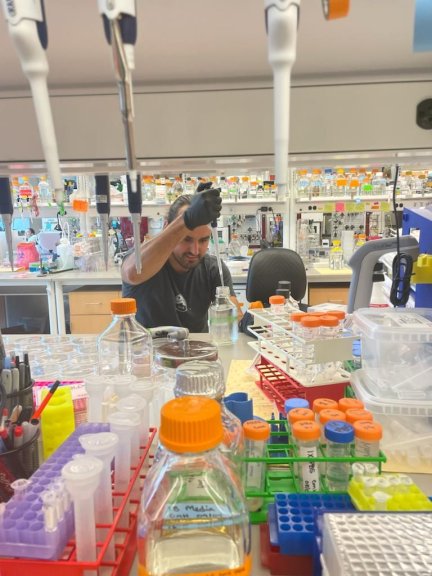Supported by an Amsterdam institute for Infection and Immunity Work Visit Travel Grant, PhD candidate Joan Capella Pujol spent multiple months at the Institute for Protein Design (IPD) in Seattle, known for its expertise in computational protein design. The IPD tackles real-world challenges in medicine, technology, and sustainability, and they have recently developed a royalty-free COVID-19 vaccine.
Joan's mission in Seattle was to learn computational design for creating new vaccine candidates targeting HCV E1E2. Utilizing machine-learning techniques, he aimed to design stable E1E2 antigens expressed as single-chain mRNA. Despite initially having limited coding skills, Joan quickly adapted, gaining proficiency in coding, navigating terminals, and using various operating systems. Read in the article below about Joan’s experiences.
"My visit to the Institute for Protein Design (IPD) in Seattle, Washington, has been an invaluable experience. While my research has primarily focused on protein design and antibody interactions, my time at the IPD's King Lab allowed me to delve into a different aspect of the same field.
The IPD stands out as a leading institution in (computational) protein design. Spending several months there, learning from the field's best, has provided me with a unique opportunity that not many professionals may encounter in their careers. The impact of this institution and the connections I have made have already enhanced my resumé. Building an international network opens doors for future collaborations and job opportunities. Interacting with experts from around the world in computational protein design, especially at prestigious conferences like Rosettacon 2023, has broadened my perspective.
Beyond establishing personal and professional relationships at the IPD, my time there equipped me with knowledge and skills previously unfamiliar to me. Despite a limited background in coding and computational skills, I adapted quickly to a new work environment, mastering essential skills in a short time frame. Navigating code, terminals, and various operating systems became crucial for my primary goal: learning computational design to create new HCV E1E2-based vaccine candidates. Using state-of-the-art tools like RFdiffusion and proteinMPNN, I successfully designed stable antigens in silico. While RFdiffusion was not publicly available until the end of my stay, I efficiently evaluated designs using metrics derived from tools like Deepmind's Alphafold. Due to time constraints, I could not validate the designed computational designs in the lab, but I will continue this work when I am back at the Amsterdam UMC. My second goal, designing nanoparticles to accommodate antigens, faced a delay due to software readiness. However, I am committed to continuing this project in collaboration with a PhD student from the King and Baker lab when I am back in Amsterdam.

As mentioned previously, the work that I started during my work visit does not conclude in the USA. I'll maintain close collaboration with the IPD to finalize designs, leveraging their resources. Our collaboration, particularly in nanoparticle design, has become part of a project led by the Sanders’ Lab at Amsterdam UMC, thanks to an open philanthropy grant awarded to our lab (Kwinten Sliepen, Rogier Sanders, and Janke Schinkel). This strengthens our professional ties with the IPD. Moreover, with assistance from IPD's IT personnel, we are establishing a computational protein design subgroup in the Sanders' Lab. Setting up our own small system through meetings with the IPD server personnel will allow us to use these techniques in-house, keeping us at the forefront of HCV and other viruses' vaccine design.'
For more information contact Joan Capella Pujol.
Text: Joan Capella Pujol and Esmée Vesseur
The Methotrexate Monitoring trial (February 2023)
AII collaboration grant in 2020, ENW-M NWO grant in 2022: the story of Nicole and Coen (October 2022)
Follow Amsterdam institute for Infection and Immunity on LinkedIn & Twitter/X.
